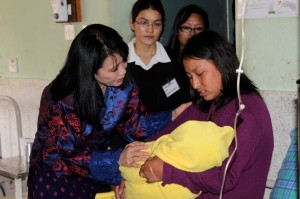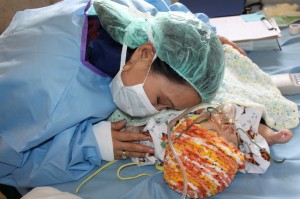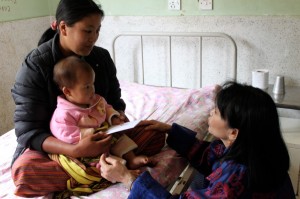In the words of Bhutan 2013 Team Member, Dr. Alex Rose
Flying into Paro Airport for the first time is an exhilarating experience. The plane banks along the Himalayan Mountains before gliding to a stop on a narrow landing strip in a small valley that seems to appear out of nowhere. It was my first time in Bhutan, as well as about half of the other team members on this Surgicorps International trip. For others, this was their seventh journey to Paro, Bhutan, where dozens of patients already lined the open halls of the hospital, awaiting our arrival. The transition from hotel to hospital was a quick one and screening began almost immediately. With the help of the Tarayana Foundation, an NGO founded by her Majesty the Queen, Ashi Dorji Wangmo Wangchuk, patients received assistance with their transportation costs from the eastern regions of the country, enabling them access to Surgicorps aid.
That first day of screening we saw dozens of children with cleft lips and cleft palates. The majority of these children were born to parents who had no family history of this congenital deformity. Some babies were quite healthy and thriving, despite this deficit. Others were more obviously impacted in their growth from an inability to feed well. The OR schedule was filling up fast with patients whom we could really help in the days following.
Prior to Bhutan, I had heard stories from other team members who had made multiple journeys to this country on Surgicorps missions. They told me of several patients they had treated over the years who had been mauled by bears, leaving them horribly disfigured and vulnerable. Sometime during the afternoon of our first screening day, we received a visit from one such patient.
This young woman in her early twenties had been a victim of a bear attack several years ago. I was shown photographs of her after the experience, her face unrecognizable, torn apart and missing many of the human features most of us take for granted every day. This visit, she entered the room quietly wearing a mask. The moment she sat down, a wave of recognition passed over Jack Demos and other team members who had been involved in her care. She removed the mask covering her mouth and nose, revealing her face—intact, whole, and once again feminine. Jack inquired about her wellbeing and she told us that since Surgicorps’ last visit, she had been married and was now six months pregnant. We were elated with this news and incredibly moved to have witnessed the full impact of what Surgicorps can do.
This young woman will likely visit Surgicorps again for future revisions of some of her scars, but this can wait until after she has her baby. Jack asked her if the Queen had heard of this wonderful news and she did not know the answer. Later in the week when we were invited to lunch with the Queen at the Paro Palace, Jack updated the Queen on the news of this patient. Every year that Surgicorps visits Paro, the Queen herself makes a visit to the hospital, rounds on the patients and gowns and gloves to visit the operating room. She embraces the patients both figuratively and literally in one of the most graceful, compassionate acts I have ever seen. She knew exactly which patient Jack was talking about and with a twinkle in her eye she told us that she indeed had heard of this young woman’s marriage and was thrilled to hear she was beginning a family.
The way in which the Queen’s foundation Tarayana and Surgicorps International have formed a relationship over the years in support of a common goal is truly remarkable. It has become a well-orchestrated collaboration instilling hope in the lives of the people of Bhutan and giving each individual impacted by these organizations the best possible chance at leading a successful and prosperous life.
We were fortunate on this trip to be accompanied not only by a fantastic team of surgeons and volunteers but also by a dentist Dr. Manteris for whom this was also a repeat visit to Bhutan. What started on his first trips to Bhutan as dentistry on a local level has now moved into the realm of health policy and prevention. His vision involves a plan to integrate fluoride administration into the school system for the prevention of tooth decay, something we take for granted in the U.S. with a fluoridated public water supply. As a first time volunteer in Bhutan, I was amazed by what my colleagues have accomplished.
At the end of a long and busy week of surgery, post-op day is always hugely gratifying. Patients and families teemed in the hallway in front of the operating theater, waiting to be seen. As they came in, one by one, we were there to witness the transformation from a week prior. Many infants who had presented with cleft lips were almost unrecognizable, their scars already diminished by the passage of a few days, their mothers held them proudly. One little boy whose hand surgery I had assisted sat there bravely for a dressing change. He didn’t flinch, didn’t cry, just looked calmly at his hand, his fingers now able to fully extend.
I will be quoting many Surgicorps volunteers of the past and future to say, how truly lucky I feel to have been a part of this experience. I fell in love with Bhutan and its people and I wish Surgicorps many more successful trips to Bhutan and wherever else the call may take them.




